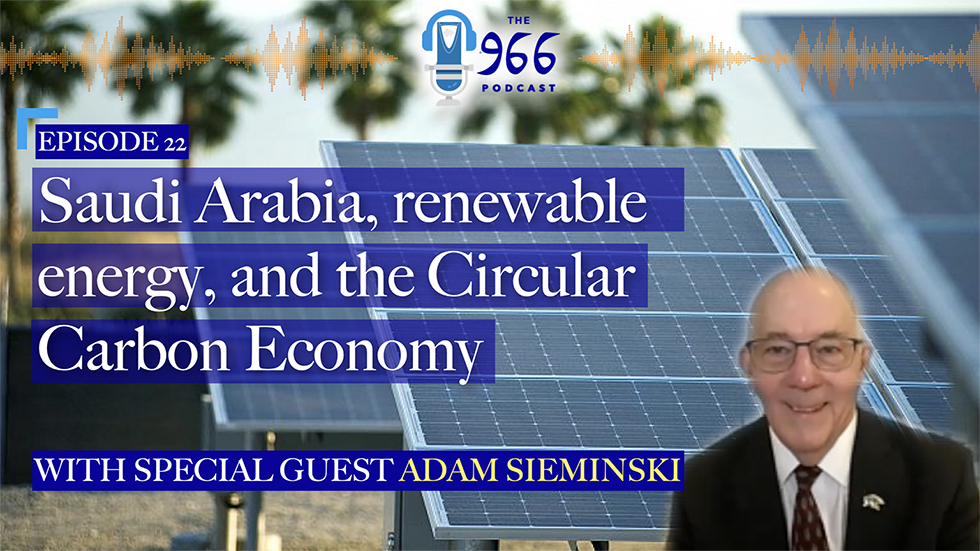The 966 welcomes a special guest for Episode 22 from Riyadh: Adam Sieminski, who just finished serving as President of KAPSARC, the leading think tank based in Saudi Arabia. Adam previously was the head of the U.S. Energy Information Agency, and was the senior director for energy and environment on the U.S. National Security Council at the White House after a long career on Wall Street as an energy analyst. On today’s show, the hosts take advantage of Adam’s deep experience in the energy industry and talk renewables and the Circular Carbon Economy as well as climate change and more.
Riyadh-based buy now pay later platform Tamara has raised $110 million in a Series A round led by leading global payment processor Checkout.com. The hosts discuss this in the context of the Kingdom’s growing venture capital ecosystem and the importance of startups for the Kingdom’s Vision 2030 economic and social reforms.
Cool Runnings 2: Saudi Arabia? The Kingdom’s first winter olympian will bear the Saudi flag at the upcoming Winter Olympic games in Beijing, China, starting February 4th. Two Saudis qualified for the games, Salman Al-Howaish and Fayik Abdi, both in skiing.
The hosts and guest discuss this and the forthcoming Mall of Saudi that will boast a massive indoor winter and ski complex under the heat of the Saudi sun.
8:46 – The Circular Carbon Economy in Saudi Arabia and the global energy transition.
It is a holistic approach that uses all the tools in the toolbox to reduce emissions. The CCE introduces a fourth “R” in the reduce, reuse, recycle framework — and that is to “remove.” This includes removal of carbon from the air – carbon capture, as well as other methods.
The G20 endorsed the CCE in 2020.
One of KAPSARC’s many ongoing research projects is the Circular Carbon Economy (CCE) Index project, which is a tool for governments and other climate change policy stakeholders to evaluate progress in support of domestic planning and decision making in the nexus of energy, emissions, and the economy.
Saudi Arabia and Aramco have now adopted the circular carbon economy framework as a way to reduce their carbon footprints.
The hosts ask guest Adam Sieminski what Saudi Arabia is doing now and is planning to do to in order to achieve a fully circular carbon economy nationally.
Saudi Arabia plans to generate 50% of its electricity from clean sources by 2030.
After COP 26, and the Kingdom’s first utilities-scale solar plant launched in June, Sakaka, the Kingdom has some momentum in this critical space.
The Kingdom has 7 independent power producer schemes in the pipeline for approximately 3 GW of PV projects coming online soon.
But the Kingdom’s total electrical capacity right now is 70 GW, so there’s a long way to go to get to Saudi Arabia’s stated goal.
Is the 50% goal of renewables by 2030 realistically achievable?
1:01:44 – Yallah! 🐪 The 966’s finishing segment to get you informed before the weekend.
•According to an OECD report, India, Saudi Arabia, France and Turkey are leading the bounceback from COVID-19 across the G20 forum of the world’s major economies. The report estimates that in the third quarter of 2021, India’s GDP grew 12.7% followed by Saudi Arabia at 5.8%.•Of the ocean’s seven known species of sea turtles, five can be found in the Red Sea and Arabian Gulf surrounding Saudi Arabia. These five species are the Olive Ridley, Loggerhead and Leatherback which are classified as vulnerable by the World Wildlife Fund and the Green and Hawksbill which are classified as endangered. The Saudi National Center of Wildlife is working to identify and protect their nesting sites and has also s established a safe haven for these turtles near Waqadi Island which is an area protected by the Red Sea Development Company.
•Saudi Energy Minister Prince Abdulaziz bin Salman Al Saud has declared the Kingdom’s intention to harness uranium as an alternative energy source. The announcement came during the recent Future Minerals Forum. He stressed that uranium mining and the development of a nuclear energy program will anchor the Kingdom’s clean energy initiative. The minister confirmed that Saudi Arabia holds a vast quantity of natural uranium, emphasizing that the government “will deal with the uranium reserves with the utmost transparency”
•Later this month Newcastle United players will travel to Saudi Arabia for the first time since the club was purchased by the country’s Public Investment Fund. The trip is designed to give the magpies, a chance to enjoy a warm-weather training camp while also giving the club the chance to take part in some media duties in an attempt to raise their profile in Saudi Arabia.
•After a one-year hiatus in 2021 due to the pandemic, 16 international teams will compete in the Saudi Tour cycling event held February 1-5 in Al-Ula. The course will be in 5 stages and will take riders through heritage sites and the challenging desert terrain of AlUla.
•Golf Saudi has produced a five-episode documentary that follows Saud Al Sharif and Faisal Salhab, two young Saudi golfers who will participate in the star-studded Saudi International being played February 3-6. The ‘See it All’ series will follow the two as they practice, train and spend time on the golf course and with their families. It will also include ‘inside the ropes’ self-shot footage from actual Saudi International tournament.









